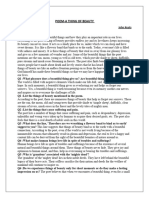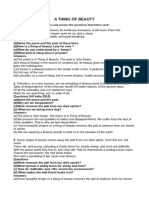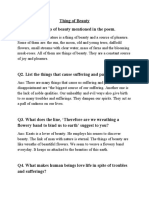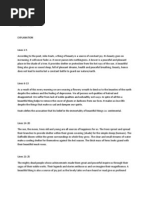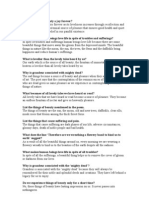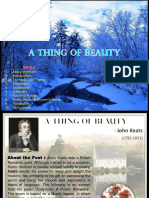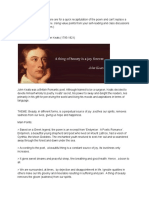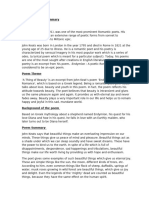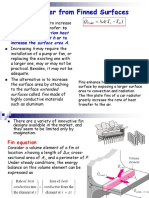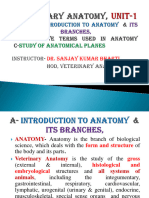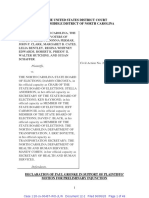ATHINGOFBEAUTY
ATHINGOFBEAUTY
Uploaded by
CONCXPTCopyright:
Available Formats
ATHINGOFBEAUTY
ATHINGOFBEAUTY
Uploaded by
CONCXPTOriginal Description:
Original Title
Copyright
Available Formats
Share this document
Did you find this document useful?
Is this content inappropriate?
Copyright:
Available Formats
ATHINGOFBEAUTY
ATHINGOFBEAUTY
Uploaded by
CONCXPTCopyright:
Available Formats
Q1. List the things of beauty mentioned in the poem.
Ans: Everything of nature is a thing of beauty and a source of pleasure. Some of
them are: the sun, the moon, old and young trees, daffodil flowers, small streams
with clear water, mass of ferns and the blooming musk-roses. All of them are things
of beauty. They are a constant source of joy and pleasure.
Q2. List the things that cause suffering and pain.
Ans: There are many things that cause us suffering and pain. Malice and
disappointment are �the biggest source of our suffering. Another one is the lack of
noble qualities. Our unhealthy and evil ways also give birth to so many troubles
and sufferings. They dampen our spirits. They act as a pall of sadness on our
lives.
Q3. What does the line, �Therefore are we wreathing a flowery band to bind us to
earth� suggest to you?
Ans: Keats is a lover of beauty. He employs his senses to discover beauty. The link
of man with nature is eternal. The things of beauty are like wreaths of beautiful
flowers. We seem to weave a flowery band everyday. It keeps us attached to the
beauties of this earth.
Q4. What makes human beings love life in spite of troubles and sufferings?
Ans: There are many things that bring us troubles and sufferings. They dampen our
spirits. However, �some shape of beauty1 brings love and happiness in our lives in
spite of such unpleasant things. A thing of beauty removes the pall of sadness and
sufferings. It makes us love life.
Q5. Why is �grandeur� associated with the �mighty dead�?
Ans: The mighty dead were very powerful and dominating persons during their own
times. Their achievements made them �mighty� and great. Their noble works dazzle
our eyes. We imagine that such mighty dead forefathers will attain more grandeur on
the doomsday. Hence �grandeur� is associated with the �mighty dead�.
Q6. Do we experience things of beauty only for short moments or do they make a
lasting impression on us?
Ans: We feel happy by coming into contact with things of beauty. They make a
lasting impression on us. Keats makes it clear at the outset. A thing of beauty is
a joy forever. It is a constant source of joy and pleasure. Its beauty never
declines or diminishes. Its loveliness goes on increasing every moment. Its value
remains undiminished. It never passes into nothingness. It removes the pall of
sadness that covers our dark spirits.
Q7, What image does the poet use to describe the beautiful bounty of the earth?
Ans: John Keats uses a very beautiful image to describe the beautiful bounty of the
earth. It is the endless fountain of immortal drink. It pours constantly into our
hearts from heaven. Thus, the beautiful bounty of the earth is called �an endless
fountain of immortal drink.�
Q1. How is a thing of beauty a joy forever?
Ans: According to John Keats a thing of beauty is a joy of forever. It is a
constant source of happiness and pleasure. Its loveliness increases every moment.
It will never pass into nothingness. In other words, a thing of beauty is never
devalued.
Q2. How does a thing of beauts provide us shelter and comfort?
Ans: John Keats is a great Romantic poet. He is rich in sensuous imagery. Nature
provides us things of rare beauty. It keeps a bower quiet for us. A bower is a
pleasant place in the shade under a tree. A thing of beauty also provides us peace
and security. We enjoy a sound sleep which is full of sweet dreams, health and
peaceful breathing.
Q3. How do us bind our self to the earth every morning?
Ans: All the Romantic poets stress upon the relationship between man and nature.
Keats believes that there is an unbreakable bond which binds man with nature and
the earth. The beauties of the earth fascinate man. Every object of nature is a
source of beauty and happiness. Everyday we are weaving a wreath of flowers. This
flowery band binds us to the beauties of this earth.
Q4. What are the things that cause miseries, sorrows and sufferings to man ?
Ans: Man himself is the root cause of all his sufferings. We suffer from malice and
distress because we lack human qualities that makes us inhuman. Our life becomes
gloomy. We cultivate unhealthy and evil ways. All such things bring miseries,
sorrows and sufferings to man.
Q5. What spreads the pall of despondence over our dark spirits? How is it removed?
Ans: Man is the creator of his woes. His own nature and actions make his life
miserable. He faces miseries and pains. A pall of despondence covers his dark
spirits. A thing of beauty provides a ray of hope to man. Some shape of beauty
works wonders amid these sorrows and sufferings. It is a thing of beauty that
removes the pall of despondence over our dark spirits.
Q6. Name the beauties of nature that are constant source of joy and happiness to
man.
Ans: Nature is a store house of beauty. The beauties of nature are endless. The
sun, the moon, old and young trees, beautiful daffodil flowers and green
surroundings are some of such beautiful things. Small streams with clear water,
thick mass of ferns, thickets of forest and musk-rose are some other things of
beauty. All such things of beauty are a constant source of joy and happiness to
man.
Q7. Why and how is �grandeur associated with the �mighty dead�?
Ans: The dooms day is considered the day of judgement, when the dead will receive
what is due to them. Our mighty dead forefathers earned name and fame with their
noble deeds. It is hoped that they will be rewarded with rare magnificence and
grandeur.
Q8. How is a thing of beauty lovelier than all the lovely tales we have heard and
read?
Ans: All beautiful things of nature are a boon for humanity. The magnificence and
beauty of objects of nature surpasses the grandeur of dooms that we have imagined
for our mighty dead forefathers. It is lovelier than all the lovely tales that we
have heard or read.
Q9. What is the source of the �endless fountain� and what is its effect?
Ans: A fountain of eternal joy�and immortality pours into the heart and soul of
man. It flows right from the heavens brink and pours into the human heart. It is
like an immortal nectar. The immortal drink that nature�s endless fountain pours
into our hearts is a source of immense joy for us.
Q10. What is the message of the poem �A Thing of Beauty�?
Ans: The very first line contains the message that John Keats, the great Romantic
poet, wants to convey. Keats was a worshipper of beauty. For him beauty was truth
and truth, beauty. Hence, for him a thing of beauty is a joy forever. Beauty never
fades. Nor is it ever devalued. It never passes into nothingness. When we are full
of sorrows and sufferings, some form of beauty comes to our rescue. It removes the
pall of sadness and sorrows and gives us joy and pleasure. Thus, beauty is a boon
for human beings.
CENTRAL IDEA - t is said that "A thing of beauty is a joy forever".
In this poem the poet tells us about the beauty. He says that beauty is not only
seen but also heard in nature. This beauty is everlasting. The sunlight, the birds,
the growing corn, and the people dancing are a lovely scene of beauty. It can be
seen in the night, In the sighing of wind, the falling of the raindrops and
chanting of a singer. In men, beauty can be seen in his good deeds and happy
thoughts. If we are beautiful inside, everything outside will look beautiful to us.
Croche says, "Handsome that handsome does".
POETIC DEVICES - Metaphor:
�bower quiet�-refers to a quiet shady part in the garden
�sweet dreams�-happy dreams
�wreathing a flowery band�-connecting to nature
`pall�-a covering like a shroud
�endless fountain of immortal drink�- refers to the deeds of great men and women
that have made them a source of inspiration for people of all times
The list of beautiful things is metaphors and symbols of nature.
Alliteration:
`noble natures�
�cooling covert�
�band to bind�
Imagery:
�flowery bands�
�shady boon�
�clear rills�
�daffodils in green world�
�grandeur of dooms�
�cooling covert�
�endless fountain of eternal drink�
Symbol:
�simple sheep� � refers to mankind as Christ is considered the shepherd who leads
human souls out of the dark world of sins and temptations
Transferred epithet:
�gloomy days� � �unhealthy and o�er darkened ways�
Oxymoron
�mighty dead�
You might also like
- Steps of Debauchery - Guide - Version Episode 1.0Document6 pagesSteps of Debauchery - Guide - Version Episode 1.0knutassmussenNo ratings yet
- Technical Rescue Riggers Guide Jl5ijg0Document2 pagesTechnical Rescue Riggers Guide Jl5ijg0Anthony ShepherdNo ratings yet
- RacketsDocument5 pagesRacketsmuralimovies100% (1)
- Internship ReportDocument20 pagesInternship ReportGaurav KushwahNo ratings yet
- The Grace of Beauty: Its Mystery, Power and Delight in Daily LifeFrom EverandThe Grace of Beauty: Its Mystery, Power and Delight in Daily LifeNo ratings yet
- Slender Column Moment MagnifierDocument8 pagesSlender Column Moment Magnifiermotiur basumNo ratings yet
- Class12athingofbeautyDocument5 pagesClass12athingofbeautystudyalltime75055No ratings yet
- Thing of Beauty QnADocument3 pagesThing of Beauty QnAMIHIR NAYAKNo ratings yet
- A Thing of Beauty Questions and AnswersDocument10 pagesA Thing of Beauty Questions and AnswersPHANINDRA M100% (1)
- A Thing of BeautyDocument5 pagesA Thing of BeautyAnanya RayNo ratings yet
- A Thing of BeautyDocument2 pagesA Thing of Beautyap6733702No ratings yet
- A Thing of BeautyDocument4 pagesA Thing of BeautyTjNo ratings yet
- a thing of beautyDocument2 pagesa thing of beautysunilkumarjd01No ratings yet
- A Thing of BeautyDocument5 pagesA Thing of Beautymahadevas1975No ratings yet
- A Thing of BeautyDocument4 pagesA Thing of Beautyrajasveersingh2007No ratings yet
- A Thing of BeautyDocument3 pagesA Thing of BeautySameehaNo ratings yet
- A Thing of BeautyDocument3 pagesA Thing of BeautyAbhishek nairNo ratings yet
- A Thing of BeautyDocument4 pagesA Thing of Beautymasood9a07sNo ratings yet
- 8336219-A Thing of Beauty-QB, 22Document4 pages8336219-A Thing of Beauty-QB, 22SatyamisLiveNo ratings yet
- A Thing of BeautyDocument8 pagesA Thing of BeautyVarun KumarNo ratings yet
- A Thing of Beauty 12thDocument4 pagesA Thing of Beauty 12thRakesh SinghNo ratings yet
- A THING OF BEAUTY (1)Document6 pagesA THING OF BEAUTY (1)Nasreen AduvannyNo ratings yet
- A Thing F BeautyDocument4 pagesA Thing F BeautymnmzzNo ratings yet
- CSK W A Thing of BeautyDocument5 pagesCSK W A Thing of BeautyAaron JoshiNo ratings yet
- Thing of BeautyDocument3 pagesThing of BeautyMB. GamingsNo ratings yet
- A Thing of BeautyDocument7 pagesA Thing of BeautyETHIRAJNo ratings yet
- ZZZ12Document3 pagesZZZ12Saksham GoyalNo ratings yet
- A Thing of Beauty PoemDocument5 pagesA Thing of Beauty PoemAstha NNo ratings yet
- A Thing of BeautyDocument12 pagesA Thing of BeautyAkshat AgarwalNo ratings yet
- A Thing of BeautyDocument22 pagesA Thing of Beautyananttuli8416No ratings yet
- Poem-4 A Thing of BeautyDocument7 pagesPoem-4 A Thing of BeautyZEUS GAMING100% (1)
- A Thing of Beauty NotesDocument2 pagesA Thing of Beauty Notesparibisla35No ratings yet
- XII - Notes - A Thing of Beauty - 2023 - 2024Document2 pagesXII - Notes - A Thing of Beauty - 2023 - 2024Hari prakarsh NimiNo ratings yet
- 261 Ki Va Ag PJM W0 JAGKW1643344363Document4 pages261 Ki Va Ag PJM W0 JAGKW1643344363ritvi PathakNo ratings yet
- A Thing of BeautyDocument4 pagesA Thing of BeautyNandita BaruahNo ratings yet
- Emailing A Thing of BeautyDocument6 pagesEmailing A Thing of Beautyradhikabathla8No ratings yet
- Flamingo (P- 4- A Thing of Beauty) (John Keats)Document4 pagesFlamingo (P- 4- A Thing of Beauty) (John Keats)dasgovindsingh1234No ratings yet
- A Thing of Beauty - Questions and AnswersDocument3 pagesA Thing of Beauty - Questions and AnswersAdnan VPNo ratings yet
- Handout - Thing of BeautyDocument6 pagesHandout - Thing of BeautySAKSHAM NAGPALNo ratings yet
- A Thing of BeautyDocument5 pagesA Thing of BeautyRamita Udayashankar100% (1)
- 2024 - 2025 Grade XII English Poem 3 A Thing of BeautyDocument9 pages2024 - 2025 Grade XII English Poem 3 A Thing of Beautyshatrudhan2007lkNo ratings yet
- 12 English-AThing of Beauty-NotesDocument6 pages12 English-AThing of Beauty-Notesaryantejpal2605No ratings yet
- A Thing of BeautyDocument16 pagesA Thing of Beautykishorepk218No ratings yet
- 00000000 (2)Document16 pages00000000 (2)aman19105477No ratings yet
- A Thing of BeautyDocument12 pagesA Thing of Beautyqfeadv100% (1)
- 4 - A Thing of Beauty Class 12Document5 pages4 - A Thing of Beauty Class 12kumarsahil9026No ratings yet
- 4.flamingo - A Thing of BeautyDocument4 pages4.flamingo - A Thing of BeautyKashish ChoudharyNo ratings yet
- A Thing of Beauty by JohnDocument6 pagesA Thing of Beauty by JohnMilena Ianigro75% (4)
- Thing of BeautyDocument7 pagesThing of BeautykanakvermamailNo ratings yet
- A Thing of Beauty by John Keats - NewDocument11 pagesA Thing of Beauty by John Keats - Newfathima anzalaNo ratings yet
- Poem 4 A Thing of BeautyDocument8 pagesPoem 4 A Thing of BeautyJamesNo ratings yet
- A Thing of Beauty-John KeatsDocument7 pagesA Thing of Beauty-John Keatsselectricbolt2No ratings yet
- A Thing of Beauty IMPORTANT Question AnswerDocument5 pagesA Thing of Beauty IMPORTANT Question AnswerjwjkekeiwhdudNo ratings yet
- A Thing of Beauty PoemDocument7 pagesA Thing of Beauty PoemDIVYJYOTI TVS, BHAGATUA, VARANASINo ratings yet
- A Thing of Beauty - SynopsisDocument5 pagesA Thing of Beauty - Synopsissourav siddeshNo ratings yet
- A Thing of Beauty AnswersDocument2 pagesA Thing of Beauty AnswersbizecotriathlonNo ratings yet
- Poem 3 A Thing of BeautyDocument1 pagePoem 3 A Thing of BeautydevinajhastudyNo ratings yet
- A Thing of Beauty NOTESDocument7 pagesA Thing of Beauty NOTESpratyushNo ratings yet
- A THING OF BEAUTY-notesDocument5 pagesA THING OF BEAUTY-notesRanya RitwikNo ratings yet
- A Thing of BeautyDocument12 pagesA Thing of BeautyHanzla AshrafNo ratings yet
- A THING OF BEAUTYDocument13 pagesA THING OF BEAUTYiamtilak2007No ratings yet
- A Thing of Beauty by Keats - NewDocument17 pagesA Thing of Beauty by Keats - Newseren4269No ratings yet
- A Thing of Beauty-1Document3 pagesA Thing of Beauty-1Shivaay SinghNo ratings yet
- A Thing of Beauty by JohnDocument11 pagesA Thing of Beauty by JohnsubhendussNo ratings yet
- What Is Theme?: What Are Some Common Themes?Document3 pagesWhat Is Theme?: What Are Some Common Themes?Aashish DahalNo ratings yet
- Acc 150 Merged CompleteDocument94 pagesAcc 150 Merged Completedelossantosellamae838No ratings yet
- Data Warehouse Final ReportDocument19 pagesData Warehouse Final ReportLi BredNo ratings yet
- Pvars QSGDocument64 pagesPvars QSGmiruna apostolNo ratings yet
- Finned HTDocument18 pagesFinned HTAhmed YehiaNo ratings yet
- 2004 SMO Questions SolutionsDocument9 pages2004 SMO Questions Solutionseermac949No ratings yet
- Project ProposalDocument17 pagesProject ProposalAmit MirjiNo ratings yet
- MFR-111 - Valve Test Record 01Document1 pageMFR-111 - Valve Test Record 01Rafiq RashidiNo ratings yet
- Brahman: The Ultimate Reality of Sanatana DharmaDocument2 pagesBrahman: The Ultimate Reality of Sanatana Dharmadharmacentral100% (1)
- System Analysis and Design - CSV MurthyDocument3 pagesSystem Analysis and Design - CSV MurthyP meghanaNo ratings yet
- Introduction, Branches, Terms of Anatomy and Study of Anatomical PlanesDocument16 pagesIntroduction, Branches, Terms of Anatomy and Study of Anatomical PlanesShaik MadeenaNo ratings yet
- MT QP 2023Document38 pagesMT QP 2023Simulacra TechnologiesNo ratings yet
- FIN 765 (2017 Fall) - SyllabusDocument7 pagesFIN 765 (2017 Fall) - SyllabusAbhishek ChandnaNo ratings yet
- MathDocument251 pagesMathac1popova.4944No ratings yet
- Unit 2Document14 pagesUnit 2jayashree sahaNo ratings yet
- ARDU-5351mini English ManualDocument15 pagesARDU-5351mini English ManualPalade LiviuNo ratings yet
- DemNC V NCSBE ECF 12-2 PDFDocument49 pagesDemNC V NCSBE ECF 12-2 PDFTazeen DhananiNo ratings yet
- Tutorial 2 SolutionsDocument4 pagesTutorial 2 SolutionsByronNo ratings yet
- Tugas Dr. Domingos Da SilvaDocument6 pagesTugas Dr. Domingos Da Silvadenilay richardoNo ratings yet
- Vacon NX OPTCI Modbus TCP Board User Manual DPD00900A UKDocument32 pagesVacon NX OPTCI Modbus TCP Board User Manual DPD00900A UKKiran AcharNo ratings yet
- Lab 1-CS-LabDocument18 pagesLab 1-CS-LabLovely JuttNo ratings yet
- Professional ReadingDocument2 pagesProfessional ReadingMaryann BaylonNo ratings yet
- Efd 501 - Activity 7 PerennialismDocument23 pagesEfd 501 - Activity 7 PerennialismCrestine Joy Jabonero MudaNo ratings yet
- 3412c Engine Parts ListDocument1 page3412c Engine Parts ListZezo TarekNo ratings yet
- San Teodoro National High School San Teodoro National High SchoolDocument3 pagesSan Teodoro National High School San Teodoro National High SchoolKen Ian Derick AcevedaNo ratings yet











